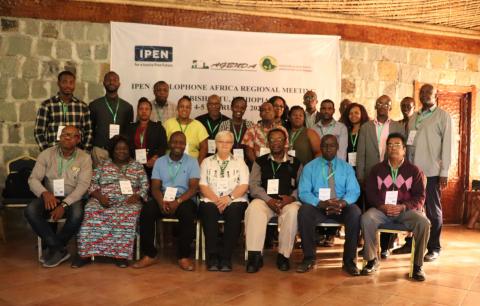Anglophone Africa Regional 2020 Meeting

Bishoftu, Ethiopia The IPEN Anglophone Africa Region held a Regional Meeting from 4 - 5 February 2020 in Bishoftu, Ethiopia. The meeting was attended by 32 participants representing 24 Participating Organizations (POs) from 13 countries: Eswatini, Ethiopia, Gambia, Ghana, Kenya, Lesotho, Mauritius, Mozambique, Nigeria, South Africa, Tanzania, Uganda, and Zambia. The IPEN Secretariat was represented by Tiffany Tool (IPEN Network Organizer) and Bjorn Beeler (IPEN International Coordinator), with a presentation from Jindrich Petrlik (Co-chair of IPEN Dioxin, PCBs and Waste Working Group, and Head of Arnika’s Toxic Waste Programme). The meeting was led by the IPEN Anglophone Africa Regional Coordinator, Silvani Mng’anya from the IPEN Regional Hub, AGENDA, based in Tanzania. The IPEN Participating Organization Pesticide Action Nexus (PAN) Ethiopia, hosted the meeting. The goal of the meeting was to promote partnerships and knowledge sharing among IPEN POs and start the groundwork for a regional POs strategy for sound management of chemicals towards toxic-free future in the Anglophone Africa Region. The main objectives were: to update IPEN POs in the region on the consolidated priority issues and existing opportunities; to enhance collaboration among IPEN POs in the region with a knowledge exchange around priority environmental health and chemical safety issues and strategies; and to develop a draft regional strategy for chemical safety based on POs priorities from 2019 survey.
During the two-day meeting, POs gave presentations on topics including chemicals in products, e-waste, pesticide management and challenges, pesticide labeling, low POPs content, marine litter, plastics and microplastics, and challenging wastes in Africa. The presentations were based on the priority issues from the 2019 survey which include pesticides (POPs and HHPs) and associated waste, chemicals in products (i.e. cosmetics, toys), electronic and associated waste, lead in paint and used lead acid battery recycling, plastic pollution, mercury in artisanal and small-scale gold mining (ASGM) and mercury in dental amalgam, and capacity and movement building.

POs expressed the need to engage more youth participation in chemicals and waste issues for the sustainability of their campaigns, and the need to link POs doing similar work at national and regional levels. Other important issues highlighted were the need to enhance partnerships with the media, link priorities to the SDGs and Agenda 2063, gender mainstreaming, and research for local data generation. Finally, to achieve the desired objective of a toxic-free future, POs requested for more capacity building to support fundraising for the priority issues.
Outcomes from the meeting included input into a regional strategy, the identified need to form national and thematic area networks, the plan to explore working together throughout the region on projects, and develop plans to collaborate with stakeholders on issues regarding chemicals and waste.
